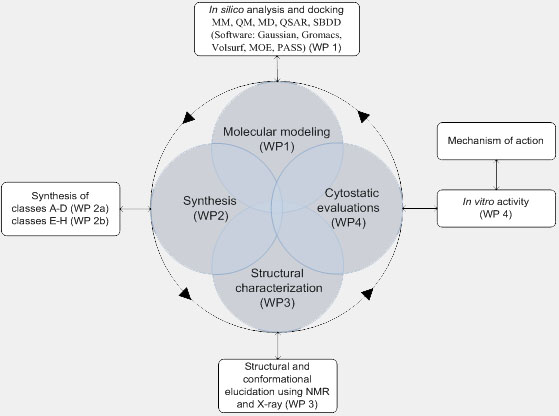Cancer is one of the most serious health problems of a worldwide dimension. One in three of the population develops cancer at some time in their lives and one in four dies from this disease. The main problems in antitumor chemotherapy are drug resistance and side effects on normal tissues. In the recent years a tremendous growth was witnessed in synthesis and development of vast number and types of new heterocyclic antitumor agents, with an emphasis on creation of new drugs with better selectivity or activity. The latter are indeed major requirements in development of novel anticancer drugs.
The proposed project aims to foster and facilitate discovery and development of novel chemotherapeutics with specific selectivity and less toxicity together with optimized pharmacological profile by extensive interdisciplinary research efforts. This will be done by design and syntheses of novel derivatives containing afore-mentioned heterocyclic scaffolds as potential anticancer agents. In parallel, computational techniques will be utilized in order to obtain insights into features of investigated molecules that would aid in optimization of their pharmacological activities/profile. We expect that the novel compounds will exert more selective and pronounced inhibitory activities (IC50 < 0.1 mol/mL)m and satisfy necessary criteria in order to be selected as lead compounds. For this purpose, in addition to phenotypic screening on various cancer cell lines, specific interactions with potential target macromolecules indicated by in silico analyses, will be considered.
The project work program consists of four interconnected work packages WP1-WP4: WP1. Molecular modelling, WP2. Synthesis of new compounds, WP3.
Structural characterization of new compounds by NMR spectroscopy and X-ray diffraction and WP4. Biological activity of newly prepared compounds.

From this purview, the proposal considers other important aspects as well including education of young medicinal chemists; management of potential issues related to the future of pharmaceutical-related intellectual property generation, and forward look onto a brewing paradox between enhanced knowledge and enhanced molecular diversity relative to the future discovery of new drugs.
 Pristupačnost
Pristupačnost